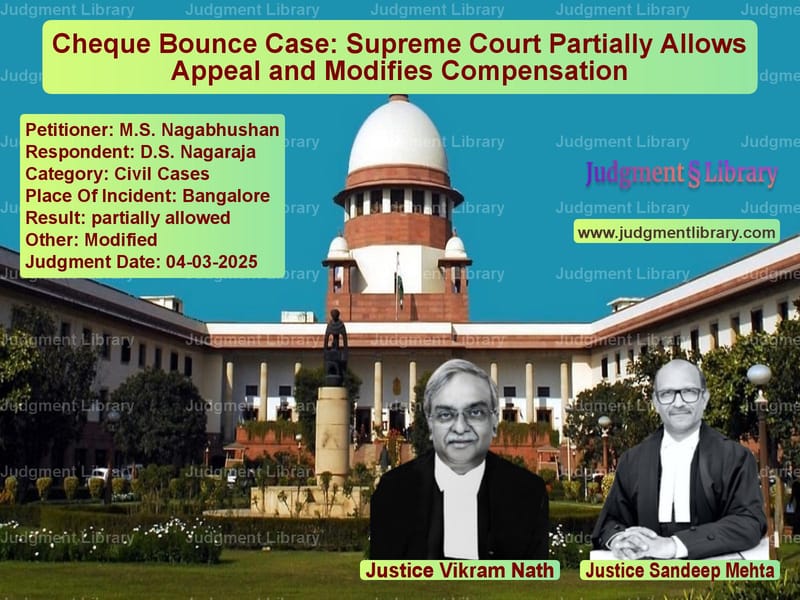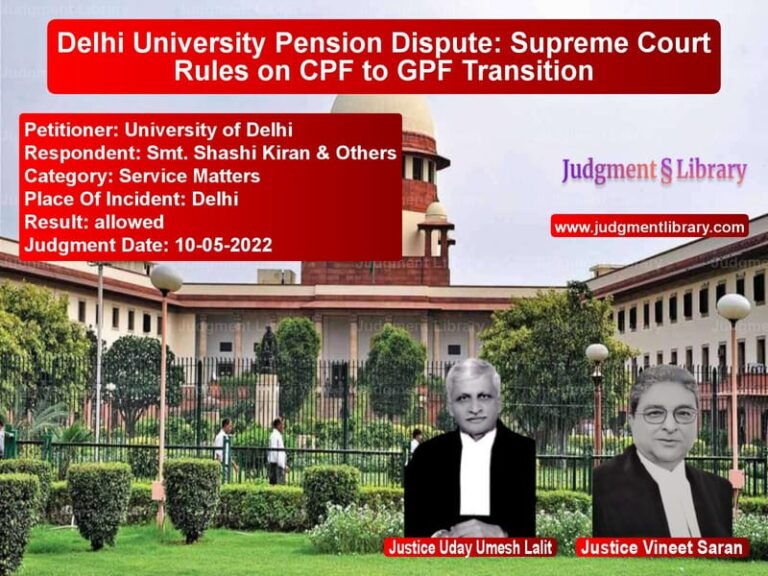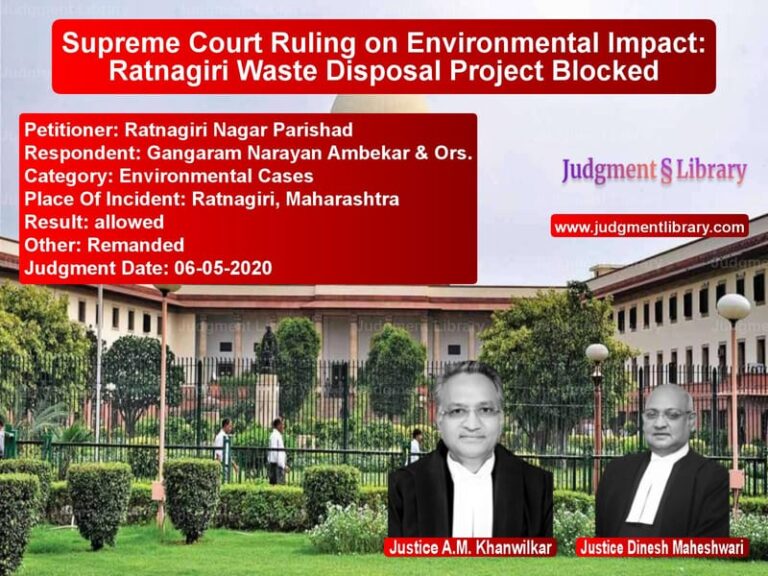Cheque Bounce Case: Supreme Court Partially Allows Appeal and Modifies Compensation
The Supreme Court of India has recently delivered a significant judgment in Criminal Appeal No(s). 11002-11009 of 2024, arising from a cheque bounce case under Section 138 of the Negotiable Instruments Act, 1881. The case involved a financial dispute between M.S. Nagabhushan (the appellant-accused) and D.S. Nagaraja (the respondent-complainant), in relation to a rental security deposit and post-dated cheques that were dishonored due to insufficient funds.
Background of the Case
The dispute arose out of a lease-cum-rent agreement signed on May 12, 2014, between the appellant-accused and the respondent-complainant for Flat No. 206 at SAN VIL Apartment in Bangalore. As per the agreement, the respondent-complainant deposited Rs. 9,00,000 as a security deposit for the rented flat. The monthly rent was fixed at Rs. 2,500, and the lease was set to expire on April 11, 2015. Upon expiration, the security deposit was to be refunded, and the respondent-complainant was expected to vacate the premises.
However, when the lease term ended, the appellant-accused could not immediately return the security deposit. Instead, he issued four post-dated cheques as repayment:
- Cheque No. 681821 dated August 20, 2015 – Rs. 2,00,000
- Cheque No. 681822 dated October 20, 2015 – Rs. 2,00,000
- Cheque No. 681827 dated December 20, 2015 – Rs. 2,00,000
- Cheque No. 681826 dated February 20, 2016 – Rs. 3,00,000
When these cheques were presented for clearance, they were dishonored with the remark ‘funds insufficient.’ This led the respondent-complainant to file four separate complaints under Section 138 of the Negotiable Instruments Act before the XXII Additional Chief Metropolitan Magistrate, Bangalore.
Trial Court Verdict
The Trial Court, on November 9, 2016, convicted the appellant-accused under Section 138 of the NI Act and ordered him to pay a total fine of Rs. 3,00,000, along with a simple interest of 6% per annum. Out of this amount:
- Rs. 2,95,000 was awarded as compensation to the respondent-complainant.
- Rs. 5,000 was forfeited to the State.
- In case of default, the accused would face one year of simple imprisonment.
Appeals in the Sessions Court
Both parties appealed against the Trial Court’s order:
- The appellant-accused sought to overturn the conviction.
- The respondent-complainant sought an increase in compensation.
The Sessions Court, on March 6, 2018, dismissed the appellant’s appeal and partially allowed the respondent’s appeal by enhancing the compensation from Rs. 3,00,000 to Rs. 9,00,000. The default imprisonment was also increased to two years.
High Court Decision
The appellant-accused then filed multiple revision petitions before the Karnataka High Court, challenging the enhanced compensation and conviction. However, on July 8, 2024, the High Court dismissed all revisions and upheld the Sessions Court’s judgment.
Arguments Before the Supreme Court
Arguments by the Petitioner (Appellant-Accused):
- The appellant-accused contended that the cheques were given as security and not for the repayment of a legally enforceable debt.
- The respondent-complainant had not vacated the premises for nearly five years, making it unfair to demand the full refund of Rs. 9,00,000.
- Since the respondent-complainant continued to reside in the flat without paying rent, the security deposit had already been adjusted.
- The Trial Court had acknowledged that Rs. 5,00,000 had been repaid.
Arguments by the Respondent (Complainant):
- The respondent-complainant argued that the cheques were issued voluntarily after the lease term ended, thus making the accused liable for dishonor.
- The rental dispute was separate from the cheque dishonor issue and should not affect the liability under the NI Act.
- The appellate and High Courts were justified in enhancing the compensation to Rs. 9,00,000.
Supreme Court’s Verdict
The Supreme Court analyzed the evidence and found that:
- The respondent-complainant continued to occupy the premises for nearly five years beyond the lease period, without paying rent or maintenance.
- The appellant-accused was entitled to deduct outstanding rent from the security deposit.
- The evidence showed that Rs. 5,00,000 had already been repaid.
- Thus, the compensation amount of Rs. 9,00,000 was excessive and should be modified.
Accordingly, the Supreme Court partially allowed the appeal and ruled:
“While setting aside the judgments of the High Court and the appellate Court, we restore the Trial Court’s order. The compensation amount shall be Rs. 3,00,000, to be paid to the respondent-complainant. Any excess amount deposited shall be refunded to the appellant-accused.”
The Supreme Court also directed that any amount already deposited, including interest, should be adjusted accordingly. The matter was disposed of with instructions for compliance within two months.
Conclusion
This judgment underscores the principle that cheques issued for security purposes are not always legally enforceable unless tied to a clear debt obligation. The Supreme Court’s decision balances both parties’ interests by ensuring fair compensation while preventing undue enrichment. This case sets an important precedent in cheque bounce matters, particularly in cases where rental disputes are involved.
Petitioner Name: M.S. Nagabhushan.Respondent Name: D.S. Nagaraja.Judgment By: Justice Vikram Nath, Justice Sandeep Mehta.Place Of Incident: Bangalore.Judgment Date: 04-03-2025.
Don’t miss out on the full details! Download the complete judgment in PDF format below and gain valuable insights instantly!
Download Judgment: m.s.-nagabhushan-vs-d.s.-nagaraja-supreme-court-of-india-judgment-dated-04-03-2025.pdf
Directly Download Judgment: Directly download this Judgment
See all petitions in Cheque Dishonour Cases
See all petitions in Contract Disputes
See all petitions in Debt Recovery
See all petitions in Judgment by Vikram Nath
See all petitions in Judgment by Sandeep Mehta
See all petitions in partially allowed
See all petitions in Modified
See all petitions in supreme court of India judgments March 2025
See all petitions in 2025 judgments
See all posts in Civil Cases Category
See all allowed petitions in Civil Cases Category
See all Dismissed petitions in Civil Cases Category
See all partially allowed petitions in Civil Cases Category







